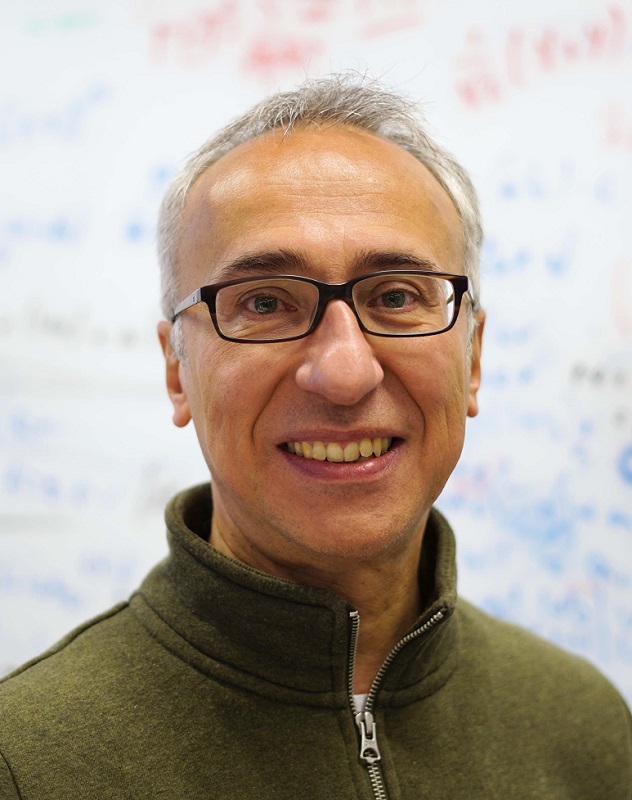
Marcello is the new scientific director of LIACS: 'It's time to give something back to the institute'
He came to the Netherlands for three months and never left. Marcello Bonsangue is the new scientific director of the Leiden Institute of Advanced Computer Science (LIACS) since January this year. 'I think it is important to be there for the people of our institute. My door is always open.'
Why did you stay in the Netherlands?
‘I did a master's degree in computer science in Milan and studied in Amsterdam on an Erasmus scholarship in 1989. Then I got an offer for a PhD position and stayed. The Netherlands has a nice working climate, which makes it attractive for scientists. In comparison, it can be challenging in Italy, with room for improvement in terms of recognition and appreciation. In the Netherlands, I especially experience the 'spirito collaborativo', the way of working together, as very positive.’
What kind of director are you?
‘I want to be an approachable director who is there for people and listens to them. The door is always open. Even though I never thought about becoming a director beforehand, it happened to me. I once joined the institute's council to get a better understanding of the institute. I also sat on the education committee of our institute and then became programme director. That felt natural: I love teaching and I like contributing to the organisation of our education.’
Why did you choose computer science?
‘As a child, I loved maths and loved thinking about it. Computer science fascinated me and abstract thinking suits me. I am into theoretical computer science, not into practical stuff. Therefore, I am definitely not good at programming, but I am good at thinking about how things work. I want to understand algorithms, check whether they work and discover where things go wrong.’
What do you want to work on with LIACS in the coming years?
‘My predecessor Aske is also immediately my role model. He leaves the institute well behind. "Marcello stay close to yourself," is his most important lesson to me. And that is what I am going to pursue. There are plenty of challenges, with a lot coming our way: a new governance model, the growth of our institute and developments in AI. And I haven't mentioned the most important one yet, which is that we want to be diverse and inclusive as an institute.
Another thing I find important is to be positive in your work. I believe you will then also get positivity back. And I hope we can maintain the pleasant atmosphere and strong mutual connection within our institute. Although that is difficult when you are growing fast. It is important that we hire the right people. And what also helps is that from March, we will all be in one location again in a beautiful new building.’
AI is booming. What is the role of AI within your institute?
‘In Leiden, we do AI together. Leiden is very strong in interdisciplinarity, which means we research AI together from different disciplines. From physics, biology, but also from the faculties of Humanities and Social Sciences. Our SAILS programme is a good example of this.
Thereby, we also do fundamental research, where there is no direct application. That is also very important: experimenting and exploring the fundamentals of our science.’
What should LIACS look like when you are ready as a director?
‘I hope that the atmosphere is still good, and that LIACS remains an institute that staff enjoys going to. And of course I hope that we will then be known as an excellent institute not only in Netherlands but all over the world. We already have that reputation in the Netherlands. I hope we can continue to build on excellent research and inspire young people with passionate education.’
Are you more of a researcher or teacher yourself?
‘Both make me very happy. I really like teaching 450 undergraduates, for example, and enjoy it when they come up with all kinds of questions during the break. But I am more of a researcher. Solving problems together with PhD candidates really gets me in the flow. I find it really special to work with these young researchers.
And yes, I do have less time for that as scientific director. That's true. But I also think it is important to give back to the institute what I myself received during my career. And now is the right time for that.’

About Marcello
Marcello Bonsangue studied Computer Science in Milan and received his PhD from the Free University in Amsterdam. He is professor of Computer Science at the Leiden Institute of Advanced Computer Science (LIACS) and its scientific director since January 2024. From 2016 to 2022, he was educational director at LIACS.
Before that, he worked as a postdoc at the Centrum voor Wiskunde en Informatica (CWI) in Amsterdam. In 2001, he came to Leiden on a five-year research grant from the Royal Netherlands Academy of Arts and Sciences (KNAW).
Text: Christi Waanders
Photo's: Inge van Dijck
